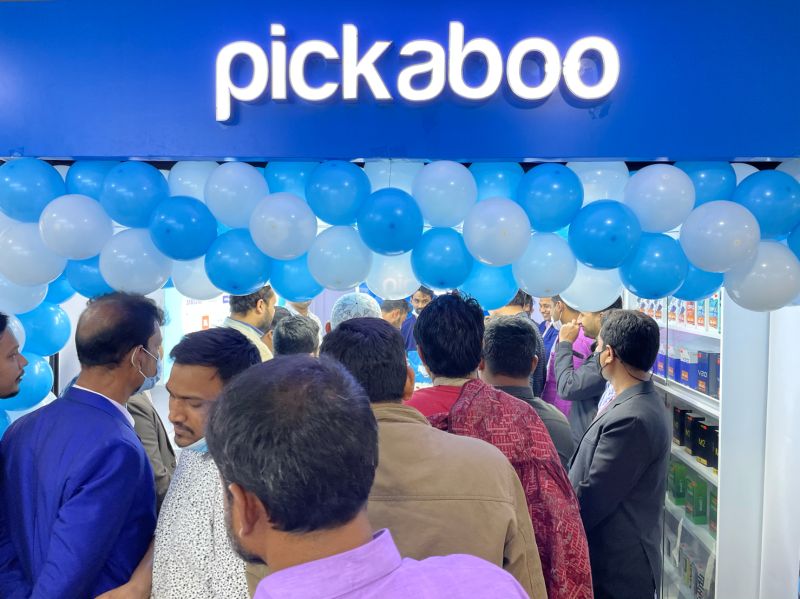
Last week, Pickaboo, the fast-growing omnichannel retail startup with a dedicated focus on mobile and gadgets, opened its 10th retail outlet in Dhaka’s Mohammadpur, Tokyo Square shopping mall.
Pickaboo has been on a sprint of late. In Q1 2020, the company moved into physical retail with an ambition to build an omnichannel operation. By the second quarter of 2020, Pickaboo has built a strong offline operation and a growing offline business complementing its online operation.
Equipped with its reputation in the online world and advantage in data and technology, the company aims to build a physical retail chain brand for mobile and gadgets in Bangladesh that will complement its online operation and vice-versa. It has an ambitious target for retail -- opening 100+ outlets in 2021 alone. The company has developed a fascinating model for retail expansion where it collaborates with smaller retail entrepreneurs.
The company sees a big opportunity in physical retail. Offline retail remains the largest market for any vertical across markets. Although the ecommerce industry has seen an extraordinary growth in the past few years, in particular in 2020 due to the coronavirus pandemic, retail continues to dominate commerce in Bangladesh and beyond. A convergence of offline and online appears to be a lucrative strategy for new commerce companies.
There are not many established multi-brand retail outlets in the mobile handset and gadget space. Similarly, a presence in physical retail can help Pickaboo to advance its position in digital commerce and vice versa.
Ecommerce has been going through a metamorphosis of late in Dhaka. Competition has relatively been cutthroat. Pickaboo, one of the earliest ecommerce players in Dhaka, stayed relatively out of the discount race. The company says it aims to build a sustainable operation and does not want to grow for the sake of growth. Instead Pickaboo has been betting on superior customer service, quality products, and service innovation to fend off competition and build a strong position in the market.
Pickaboo sees a strong offline presence can not only complement its online operation, but it can also effectively help the company create strong moats. From Inside Pickaboo’s Online-Offline Strategy to Become Country’s Largest Gadget Hub:
“Marrying online and offline operation offers several benefits to Pickaboo. It improves competitive moats. Gives access to a larger market opportunity. Eventually, offline outlets can be utilized as delivery hubs for online deliveries that will reduce friction and cost and will allow building a hyper-local ecommerce model improving both speed and cost structure for Pickaboo.
Pickaboo already allows customers to collect their online orders from their nearby Pickaboo outlet for free of charge. When a Pickaboo user places an order online, he/she sees two options: click and collect from a Pickaboo outlet and another is regular delivery collections.
The combined operation strengthens Pickaboo’s overall demand aggregation improving Pickaboo’s leverage with partners such as Samsung and Huawei and thus enabling Pickaboo to offer better benefits to customers.
Pickaboo’s strong online brand image helps Pickaboo in building an online operation both with suppliers and customers. If Pickaboo offline was a separate brand, it would have been an uphill battle for Pickaboo to have similar leverage with partners and build brand awareness with customers within a short time. Since Pickaboo has an existing relationship with partners for its online operation, offline operation helps to take that relationship a notch up. Pickaboo already has a reputation as an ecommerce that cares about customer service that has helped it attract customers offline.
Finally, while offline and online operation works independently, Pickaboo uses the same planning process and resources for both offline and online operations which improves efficiency.”
****
This convergence of offline and online commerce is happening across markets. Pickaboo is not the first company trying to build an omnichannel business.
A growing number of ecommerce players starting from Alibaba to Amazon to local Khaas Food and Neofarmers have been moving into offline retail in search of expansion and stronger competitive moats.
It has certain strategic relevance in Bangladesh given the strength of offline retail in the country and an apparent deficit of trust in ecommerce. It does not come without a cost though. Offline remains expansive and fraught with equally intense competition. Pickaboo says it has the advantage of brand, data, and focus on one category, at least for now. To that end, a convergence of offline and online commerce can help it expand the market and achieve strategic upsides.
